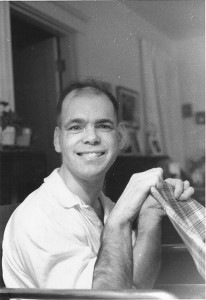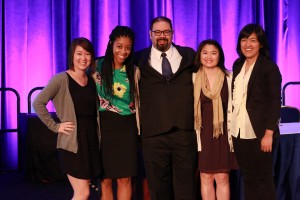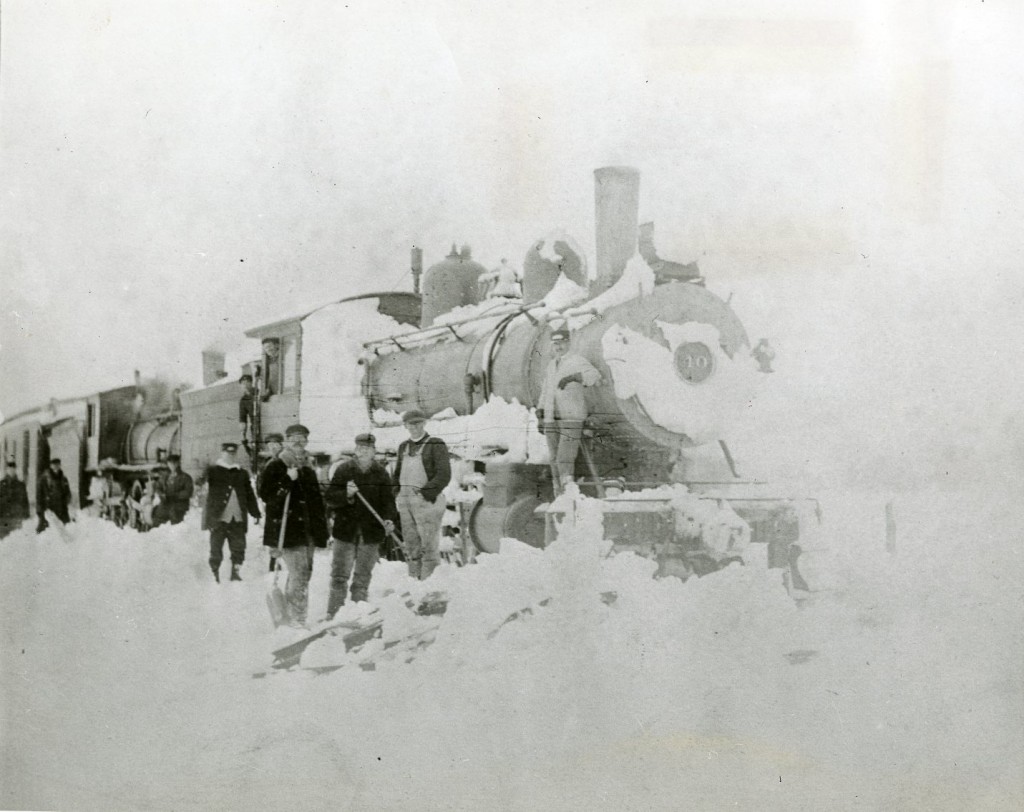We here in Archives & Special Collections are ready for whatever Mother Nature throws at us in the next couple of days! We’ll dig ourselves out of the snow just like these railroad workers from 1914.
Yearly Archives: 2015
Larry Eigner letters published in Poetry Magazine
 Six letters by poet Larry Eigner from 1954 to 1964 are published for the first time in the December 2014 issue of Poetry Magazine, including a letter from Larry Eigner to Charles Olson dated October 20, 1956. The letter, from the Charles Olson Research Collection housed here in Archives and Special Collections, was selected for Poetry Magazine by co-editors Jennifer Bartlett and George Hart.
Six letters by poet Larry Eigner from 1954 to 1964 are published for the first time in the December 2014 issue of Poetry Magazine, including a letter from Larry Eigner to Charles Olson dated October 20, 1956. The letter, from the Charles Olson Research Collection housed here in Archives and Special Collections, was selected for Poetry Magazine by co-editors Jennifer Bartlett and George Hart.
Jennifer Bartlett, a poet who is currently writing a biography of Larry Eigner, was awarded a travel fellowship by the Archives to use the Larry Eigner Papers. Her work reflects a fresh and growing attention on the life and poetry of Larry Eigner that has emerged in recent years.
Larry Eigner (1927–1996) wrote over three thousand poems on a manual Royal typewriter and was an energetic letter-writer. He published more than 40 collections of poetry, among them From the Sustaining Air (1953), Another Time in Fragments (1967), Things Stirring / Together / or Far Away (1974), now there’s-a-morning-hulk of the sky (1981), and Waters / Places / A Time (1983).
George Hart writes in the Introduction to the letters:
Throughout the fifties, Eigner absorbed Olson’s theory of Projective Verse, and he was grouped with the Black Mountain poets in Donald Allen’s groundbreaking The New American Poetry anthology in 1960. Of the poets in this group — Olson, Creeley,Robert Duncan, and Denise Levertov (Corman chose not to be included in the anthology) — Eigner might be the one who put Olson’s theories to work most productively. Projective Verse, with its emphasis on the exchange of energy between poet and reader, and the typewriter as a means of graphing or scoring words on the space of the page, seems particularly well-suited to Eigner’s embodiment and temperament. The fact that Olson put so much stress on the stance of the poet and the poet’s breath as a form of measure, which might seem to discourage someone like Eigner who had difficulty walking and speaking, makes Eigner’s achievement even more impressive. In excerpting Eigner’s correspondence for this special feature,Jennifer Bartlett and I have chosen to focus on passages in which he writes about, or directly to, Olson regarding his poetry, poetics, and other Black Mountain poets.
Considering a degree in archival science?
 Students and emerging professionals from traditionally underrepresented racial and ethnic minority groups interested in pursuing a masters degree in archival science are eligible for the Society of American Archivists/Association of Research Libraries Mosaic Program. The Program provides tuition stipends, practical work experience, career placement assistance and leadership development. The Call for Applications was announced this week. Applications are due by February 28, 2015.
Students and emerging professionals from traditionally underrepresented racial and ethnic minority groups interested in pursuing a masters degree in archival science are eligible for the Society of American Archivists/Association of Research Libraries Mosaic Program. The Program provides tuition stipends, practical work experience, career placement assistance and leadership development. The Call for Applications was announced this week. Applications are due by February 28, 2015.
Read about the current group of Mosaic Fellows — and details about the program at ARL/SAA Mosaic Program.
Acknowledgment from a Strochlitz awardee
Dr. Craig J. Peariso, a Strochlitz awardee from a few years ago, has had his book Radical theatrics: Put-ons, politics and the Sixties published by the University of Washington Press. Focusing on left-wing political activism of the 1960s, Dr. Peariso argues that “these over-the-top antics were far more than just the spontaneous actions of a self-indulgent radical impulse” (jacket flap). Having done exhaustive research in the Archives’ Hoffman Family Papers, Dr. Peariso writes in his acknowledgement: “Archivists at numerous libraries have also played a key role in the completion of this work. Specifically, I would like to thank Terri Goldich and the staff at the University of Connecticut’s Thomas J. Dodd Research Center. Their award of a [Rose and] Sigmund Strochlitz Travel Grant and their assistance in navigating the Hoffman Family Papers were vital at the earliest stages of my research.” Thank you, Dr. Peariso, for confirming for us how valuable the Strochlitz grants are in support of academic research and scholarship.

